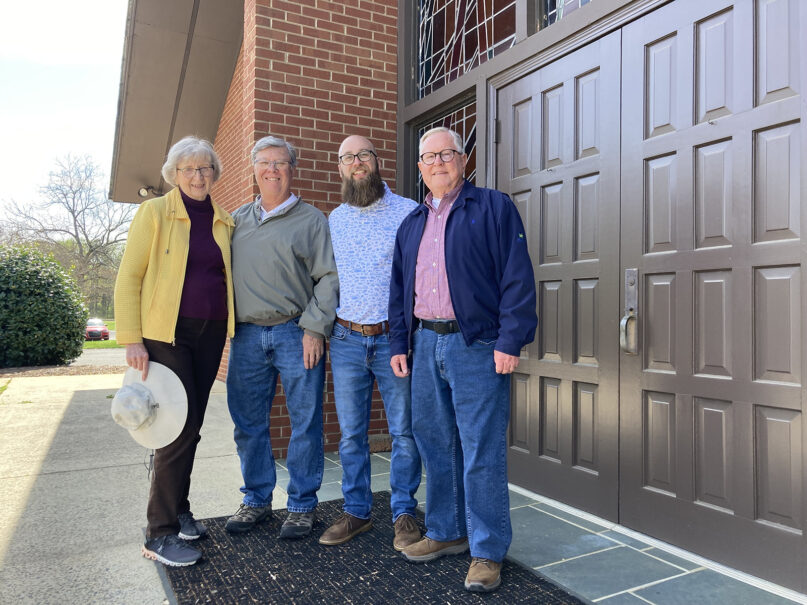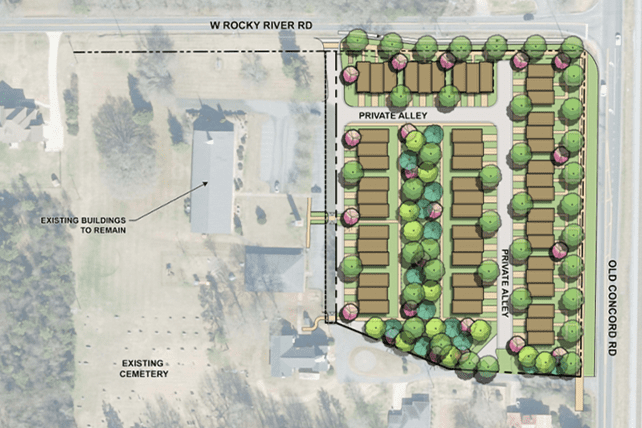They initially came back with different answers: a soccer field, a farmers market, a student hub for the nearby University of North Carolina Charlotte campus.
Over time, the church elders coalesced around a dream of a housing community that would nurture young families, just as the church had nurtured them 50 years before.

Freda Schlaman, from left, Tim Gilland, the Rev. Matt Conner and Trent Thompson pose together at Newell Presbyterian Church in Charlotte, N.C. (RNS photo/Yonat Shimron)
Trent Thompson, 71, remembered how he and his wife moved to Charlotte in the early 1980s so he could finish his undergraduate degree at the university after his service in the Coast Guard. Shortly after they found the church, their first son was born, 11 weeks premature. Church members enveloped the young family with care during the two months their son was in the hospital.
“The church loved us and helped us out with anything we needed, prayer requests, people visiting us, meals,” said Thompson. “That meant a lot to us.”
Freda Schlaman, 79, remembered that the church had a vibrant youth program that her two daughters loved — so much so, one of them later became a Presbyterian minister. “It was a small church and it was what we needed,” said Schlaman. “We fell in love with the people along the way.”
The church’s members envisioned an affordable housing complex that would allow today’s young families — many of whom are priced out of Charlotte’s competitive real estate market — to do the same. They were clear they did not want to build rental apartments, but rather offer working-class families — teachers, firefighters, social workers — homes they could afford.
That meant the church would build fewer units and likely get less money from the sale than if it had sold to a commercial developer. “A lot of churches will just say, ‘Sell it. Let’s get some money so we can have operating capital,’” said Thompson. “But our point was, we’re not gonna do that. As the stewards of the community, we wanted to help to rebuild the idea that Newell is a community that thrives on the family concept. We wanted people that get a chance to put down roots.”
The church turned to DreamKey Partners, a nonprofit real estate development company that has worked with a handful of other churches in the Charlotte area. Church leaders won’t say how much money they will get from the sale, since the contract hasn’t yet been signed. A lot also depends on whether the city will award the project the full $3.1 million from its Housing Trust Fund, designated to provide gap financing to developers to build affordable housing.
The church is already considering a phase two: renting out parts of its education building to nonprofit business incubators, perhaps starting a coffee shop, and creating a playground or park for the children.
The church’s goal, said Conner, using a biblical reference, is not to store up money in bigger barns. “We are selling some land for the sake of this call to build up the beloved community, and honestly all it costs us is a yes,” Conner said.
Eight miles away from the Newell church, another Presbyterian congregation has also committed itself to affordable housing. Caldwell Presbyterian has converted a 14,000-square-foot building that once housed Sunday school classrooms into 21 studio apartments for people coming out of chronic homelessness. After it opens in October, the church will turn the building over to a local nonprofit that will oversee day-to-day operations.
For Caldwell Presbyterian, the vision is the same as Newell’s, even if the initial impetus was not. A bigger, midsized church, Caldwell wasn’t financially squeezed. But like Newell, it saw a need.

